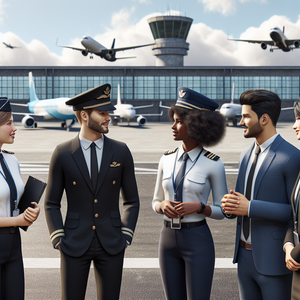
Expanding Horizons in Aviation: Diverse Career Paths Beyond Piloting
The aviation sector is a vast and diverse field that offers a multitude of career options beyond the well-trodden path of becoming a pilot. If you hold an aviation degree, you have the opportunity to delve into specialized roles ranging from engineering to safety management and airport operations. While aspiring to be a pilot is a common goal, this article aims to illuminate the myriad rewarding careers available to those enthusiastic about aviation technology, safety, and operational efficiency.
Job Summaries:
Air Traffic Controller:
- Air traffic controllers play a pivotal role in ensuring the safety of air travel.
- They are tasked with coordinating the movement of aircraft both in the air and on the ground using advanced radar systems.
- This position requires quick thinking and exceptional communication skills, as controllers must relay instructions to pilots under pressure.
- Typically, you need a degree in aviation or a related discipline, along with FAA certification.
- Attaining an average salary of around $138,000, this career sees a projected growth rate of 3% in the coming decade, underscoring its vital importance.
Flight Instructor:
- Flight instructors are the backbone of pilot training.
- They teach everything from basic flying techniques to advanced navigation.
- Instructors must possess a commercial pilot's license and an instructor certification.
- They need substantial flight hours.
- This role fosters the next generation of aviators.
- Instructors can share their passion for flying.
- They can earn between $50,000 and $100,000 annually.
- Demand for qualified professionals is steadily increasing.
Aerospace Engineer:
- Aerospace engineers are involved in designing and testing aircraft and spacecraft.
- They apply principles of engineering, physics, and materials science.
- A bachelor’s degree in aerospace engineering is generally required.
- Strong analytical capabilities are necessary.
- Salaries in this field range from $80,000 to $150,000.
- Job growth is projected at 8% over the next decade due to ongoing technological advancements.
Aircraft Mechanic:
- Responsible for the upkeep and repair of aircraft.
- Aircraft mechanics play a crucial role in maintaining safety standards.
- This position typically requires an Airframe and Powerplant (A&P) certification from the FAA, alongside relevant training.
- Mechanics can expect salaries between $50,000 and $75,000.
- There is consistent demand as aviation safety regulations become increasingly stringent.
Aviation Management Professional:
- Aviation management professionals handle the business aspects of airlines, airports, and aviation organizations.
- They need a blend of knowledge in aviation regulations and business practices.
- Often requiring a degree in aviation management.
- Salaries can vary widely from $60,000 to over $120,000, depending on the position and organization.
- Projected growth rate of around 5%.
Flight Dispatcher:
- Flight dispatchers are responsible for planning and overseeing flight operations.
- They ensure routes are efficient and weather conditions are safe.
- Most hold an FAA Aircraft Dispatcher Certificate.
- They require strong analytical and regulatory knowledge.
- Salaries typically range from $45,000 to $85,000.
- There is a growing demand in this field as air travel rises.
Aviation Safety Inspector:
- Ensuring compliance with safety standards.
- Aviation safety inspectors conduct thorough examinations of aircraft and operations.
- This role demands a deep understanding of aviation safety protocols.
- Prior experience in flight operations or maintenance is often necessary.
- Inspectors earn between $70,000 and $110,000 annually.
- A steady demand is anticipated due to ongoing regulatory requirements.
Airport Operations Manager:
- Airport operations managers oversee daily activities within airports.
- They ensure smooth operation across various departments.
- This role typically requires a degree in aviation management.
- Strong leadership skills are essential for this role.
- Salaries can range from $70,000 to over $130,000.
- Growth is expected as global air travel continues to expand.
Avionics Technician:
- Avionics technicians specialize in the electronic systems of aircraft, such as navigation and communication.
- This role requires technical skills and attention to detail.
- Often necessitating completion of an aviation maintenance program.
- Salaries typically range from $50,000 to $80,000.
- With a positive job outlook as technology in aviation evolves.
Aircraft Sales Representative:
- Selling new and used aircraft
- Sales representatives must possess a robust understanding of aviation products
- Excellent interpersonal skills are required
- Typically, a background in aviation or business is preferred
- Salaries range from $60,000 to over $120,000
- Salaries are influenced by commission structures
Corporate Pilot:
- Corporate pilots provide transportation for company executives.
- Requires a private pilot license and extensive flight experience.
- Responsibilities include travel planning and aircraft readiness.
- Salaries for corporate pilots can range from $70,000 to $120,000, depending on experience.
Agricultural Pilot:
- Specializing in crop dusting, agricultural pilots apply chemicals to crops using aircraft.
- This role requires a commercial pilot license and specific training.
- Salaries range from $50,000 to $90,000, with demand varying according to agricultural needs.
Aviation Meteorologist:
- Aviation meteorologists provide crucial weather forecasts impacting flight operations.
- A degree in meteorology or atmospheric science is required.
- Salaries can range from $60,000 to $100,000.
- Job prospects are expected to grow as weather plays a critical role in aviation safety.
Flight Test Engineer:
- Flight test engineers conduct performance and safety evaluations on new aircraft.
- This role requires a solid engineering background.
- Salaries for flight test engineers range from $80,000 to $130,000.
- The salaries reflect the specialized nature of this role.
Aviation Compliance Officer:
- Ensuring organizations adhere to regulations.
- Aviation compliance officers often hold a background in aviation management or law.
- Salaries typically range from $60,000 to $100,000, depending on experience.
Airline Operations Coordinator:
- Coordinators manage aspects such as crew scheduling and customer service.
- Strong organizational skills are required.
- Salaries range from $50,000 to $85,000.
- Salaries reflect the critical nature of their role in airline operations.
Aviation Project Manager:
- Aviation project managers oversee specific projects within the sector.
- Leadership and project management expertise are necessary.
- Salaries typically range from $70,000 to $120,000.
- There is increasing demand as aviation projects evolve.
Aviation Marketing Specialist:
- These specialists create marketing strategies for aviation entities.
- Often preferring candidates with a degree in marketing or aviation management.
- Salaries typically range from $50,000 to $90,000.
Aircraft Interior Designer:
- Focusing on designing functional and aesthetically pleasing interiors for aircraft.
- This role requires a design background and knowledge of aviation regulations.
- Salaries range from $60,000 to $100,000.
Aviation Security Manager:
- Aviation security managers develop safety protocols to protect passengers and aircraft.
- A degree in aviation security or criminal justice is often required.
- Salaries typically range from $70,000 to $120,000.
As you consider your future in aviation, these diverse career paths offer exciting prospects for those with an aviation degree. The industry continues to evolve, driving demand for skilled professionals across various roles. Explore these opportunities and find a career that aligns with your interests and aspirations! Whether you're drawn to the technical, operational, or managerial aspects of aviation, there’s a place for you in this dynamic field.
Explore More Jobs

